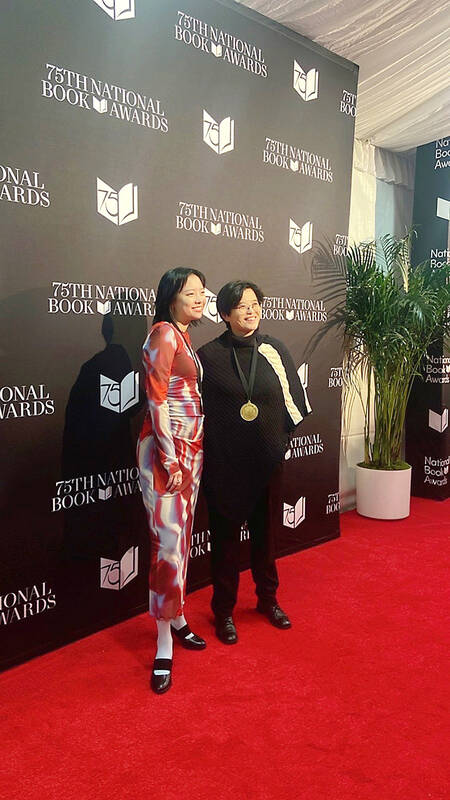The English translation of Yang Shuang-zi’s (楊?子) Taiwan Travelogue (臺灣漫遊錄) made history after it became the latest winner of the US National Book Award for Translated Literature.
The novel, translated from Chinese by Lin King (金翎), was recognized at an award ceremony on Wednesday in New York, making it the first work by a Taiwanese author to receive the honor since the category was established in 1967.
The National Book Awards are considered among the world’s most prestigious literary prizes, alongside the Man Booker Prize and the Nobel Prize for Literature, the New York Times said.

Photo courtesy of the Taipei Cultural Center in New York via CNA
In her acceptance speech, Yang reflected on Taiwan’s complex identity, drawing similarities between its current relationship with China and its historical ties to Japan.
She highlighted the divided identities of Taiwanese, saying: “Some think they are Chinese, just as some thought they were Japanese 100 years ago. I wrote this book to explore what it means to be Taiwanese.”
Taiwan Travelogue tells the story of a Japanese writer who visits Taiwan in 1938 and embarks on a culinary journey across the island with her local interpreter.
The narrative, set against the backdrop of Taiwan’s railway network, “unburies lost colonial histories and deftly reveals how power dynamics inflect our most intimate relationships,” according to the award’s Web site.
Yang said that she often faces questions about why she writes about events from a century ago.
“[I] wrote about the past to move on to the future,” she said, emphasizing that Taiwan has long faced challenges from powerful neighboring countries.
“As early as at least 100 years ago, there were Taiwanese saying Taiwan belongs to its people,” she added.
Yang Shuang-zi is a pen name shared by twin sisters Yang Jo-tzu (楊若慈), who focused on writing, and Yang Jo-hui (楊若暉), who specialized in conducting historical research and Japanese translations.
The pen name, meaning “twins” in Japanese Kanji, was adopted to reflect their collaboration.
Despite Jo-hui’s death from cancer in 2015, Jo-tzu continued to use the pseudonym in honor of her sister.
Translator Lin King began working on Taiwan Travelogue as a graduate student.
She described the book as “translation literature about translation literature,” emphasizing her efforts to capture the essence of the original text without overly Westernizing it.
King expressed gratitude to Yang for her trust, as well as to the editor and staff at Graywolf Press, the book’s US publisher.
“I hope this book introduces Taiwan’s culture and history to readers around the world,” King said.
Born in the US, but raised in Taiwan, King has previously received the PEN/Robert J. Dau Short Story Prize for Emerging Writers, according to the award’s Web site.
Taiwan Travelogue was first published in Chinese by SpringHill Publishing in 2020.
A Japanese translation was released last year, with more than 10,000 copies printed so far, according to the book’s Taiwanese publisher.
Talks are under way for additional translation rights, with a Korean edition already confirmed following the book’s shortlisting for the National Book Awards in September.
In May, the Japanese version of the novel became the first Taiwanese work to win Japan’s Best Translation Award.

Several Chinese Nationalist Party (KMT) officials including Chairman Eric Chu (朱立倫) are to be summoned for questioning and then transferred to prosecutors for holding an illegal assembly in Taipei last night, the Taipei Police said today. Chu and two others hosted an illegal assembly and are to be requested to explain their actions, the Taipei City Police Department's Zhongzheng (中正) First Precinct said, referring to a protest held after Huang Lu Chin-ju (黃呂錦茹), KMT Taipei's chapter director, and several other KMT staffers were questioned for alleged signature forgery in recall petitions against Democratic Progressive Party (DPP) legislators. Taipei prosecutors had filed

Taiwan would welcome the return of Honduras as a diplomatic ally if its next president decides to make such a move, Minister of Foreign Affairs Lin Chia-lung (林佳龍) said yesterday. “Of course, we would welcome Honduras if they want to restore diplomatic ties with Taiwan after their elections,” Lin said at a meeting of the legislature’s Foreign Affairs and National Defense Committee, when asked to comment on statements made by two of the three Honduran presidential candidates during the presidential campaign in the Central American country. Taiwan is paying close attention to the region as a whole in the wake of a

NEW WORLD: Taiwan is pursuing innovative approaches to international relations through economics, trade and values-based diplomacy, the foreign minister said Taiwan would implement a “three-chain strategy” that promotes democratic values in response to US tariffs, Minister of Foreign Affairs Lin Chia-lung (林佳龍) said. Taiwan would aim to create a “global democratic value chain,” seek to capitalize on its position within the first island chain and promote a “non-red supply chain,” Lin was quoted as saying in the ministry’s written report to the Legislative Yuan submitted ahead of the legislature’s Foreign Affairs and National Defense Committee meeting slated for today. The Ministry would also uphold a spirit of mutual beneficial collaboration, maintaining close communication and consultations with Washington to show that Taiwan-US cooperation

President William Lai (賴清德) has appointed former vice president Chen Chien-jen (陳建仁) to attend the late Pope Francis’ funeral at the Vatican City on Saturday on his behalf, the Ministry of Foreign Affairs said today. The Holy See announced Francis’ funeral would take place on Saturday at 10am in St Peter’s Square. The ministry expressed condolences over Francis’ passing and said that Chen would represent Taiwan at the funeral and offer condolences in person. Taiwan and the Vatican have a long-standing and close diplomatic relationship, the ministry said. Both sides agreed to have Chen represent Taiwan at the funeral, given his Catholic identity and